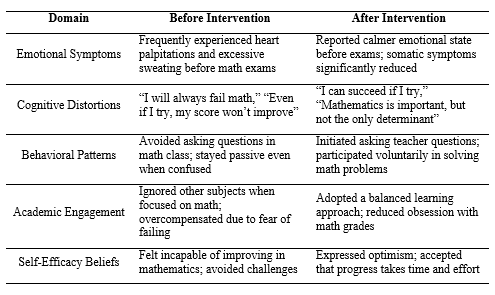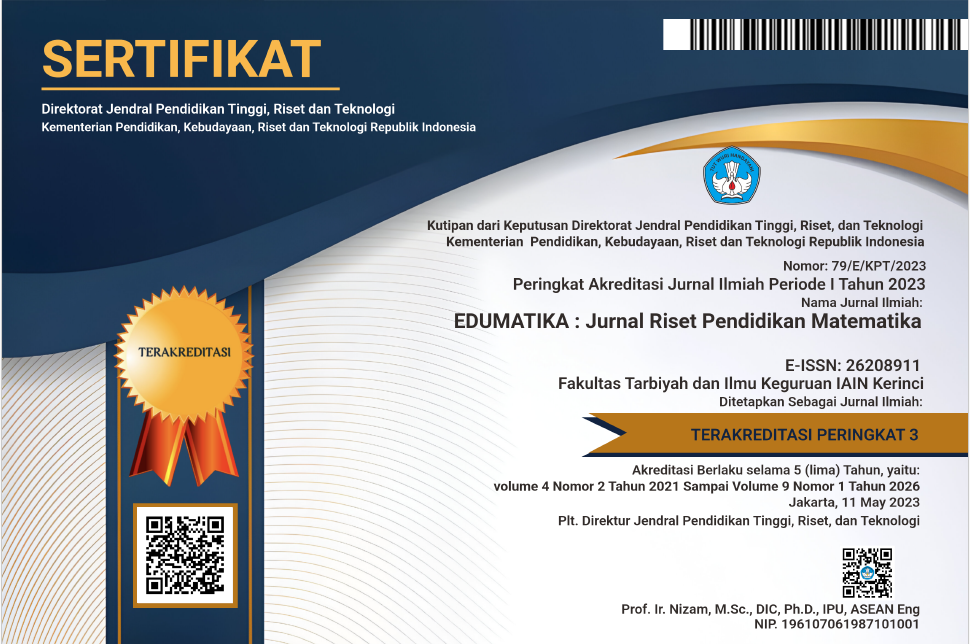A Case Study of Math Anxiety in High School Students: Assessment, Dynamics, and Intervention
Abstract
Mathematics anxiety is a pervasive issue among adolescents, often impairing academic performance and emotional well-being. This study investigates the psychological profile of an Indonesian high school student experiencing mathematics anxiety following an academic transition from the UK to Indonesia and evaluates the effectiveness of a Cognitive Behavioral Therapy (CBT) intervention in reducing her anxiety. This research used a single-case qualitative design; data were gathered through psychological assessments (IST, DAT A5, SSCT, graphic tests), structured interviews with the participant, parents, and teachers, and behavioral observations. A five-session CBT intervention focusing on cognitive restructuring was conducted over two weeks. The assessment revealed average intellectual ability but significant cognitive distortions, physiological symptoms, and avoidance behaviors related to mathematics. Post-intervention findings demonstrated notable improvements in cognitive beliefs, emotional regulation, class participation, and help-seeking behavior. The participant, her teacher, and her mother all reported reduced anxiety and improved academic coping. The findings support the use of CBT as an effective and culturally adaptable approach for addressing mathematics anxiety in adolescents. The study emphasizes the role of cognitive patterns, emotional processes, and environmental influences in the development and resolution of academic anxiety. These insights are relevant for educators, school psychologists, and mental health professionals working in diverse educational settings. However, due to its single-case design and reliance on self-reported outcomes, the generalizability of the findings is limited and further research with larger and more diverse samples is recommended.
Downloads
References
Asanjarani, F., & Zarebahramabadi, M. (2021). Evaluating the effectiveness of cognitive-behavioral therapy on math self-concept and math anxiety of elementary school students. Preventing School Failure: Alternative Education for Children and Youth, 65(3), 223–229. https://doi.org/10.1080/1045988X.2021.1888685
Beilock, S. L., & Ramirez, G. (2011). On the Interplay of Emotion and Cognitive Control: Implications for Enhancing Academic Achievement (pp. 137–169). https://doi.org/10.1016/B978-0-12-387691-1.00005-3
Cheng, D., Ren, B., Yu, X., Wang, H., Chen, Q., & Zhou, X. (2022). Math anxiety as an independent psychological construct among social‐emotional attitudes: An exploratory factor analysis. Annals of the New York Academy of Sciences, 1517(1), 191–202. https://doi.org/10.1111/nyas.14902
Cuder, A., Pellizzoni, S., Di Marco, M., Blason, C., Doz, E., Giofrè, D., & Passolunghi, M. C. (2024). The impact of math anxiety and self‐efficacy in middle school STEM choices: A 3‐year longitudinal study. British Journal of Educational Psychology, 94(4), 1091–1108. https://doi.org/10.1111/bjep.12707
Doz, E., Cuder, A., Pellizzoni, S., Granello, F., & Passolunghi, M. C. (2024). The interplay between ego-resiliency, math anxiety and working memory in math achievement. Psychological Research, 88(8), 2401–2415. https://doi.org/10.1007/s00426-024-01995-0
Gunderson, E. A., Ramirez, G., Levine, S. C., & Beilock, S. L. (2012). The role of parents and teachers in the development of gender-related math attitudes. Sex Roles, 66(3–4), 153–166. https://doi.org/10.1007/s11199-011-9996-2
Habibi, M., Wahyuni, N., Rusliah, N., Ilham, M., & Fitri, I. (2021). The effect of mathematics anxiety and intelligence on students’ logical thinking ability. Edumatika : Jurnal Riset Pendidikan Matematika, 4(1), 77–89. https://doi.org/10.32939/ejrpm.v4i1.1102
Hofmann, S. G., Asnaani, A., Vonk, I. J. J., Sawyer, A. T., & Fang, A. (2012). The efficacy of cognitive behavioral therapy: A review of meta-analyses. Cognitive Therapy and Research, 36(5), 427–440. https://doi.org/10.1007/s10608-012-9476-1
Jonathan, A. S., Paul, F., & Michael, L. (2021). Interpretative Phenomenological Analysis: Theory, Method and Research (Second). Sage Publication.
Justicia‐Galiano, M. J., Martín‐Puga, M. E., Linares, R., & Pelegrina, S. (2017). Math anxiety and math performance in children: The mediating roles of working memory and math self‐concept. British Journal of Educational Psychology, 87(4), 573–589. https://doi.org/10.1111/bjep.12165
Kelly, S., Romero, A., Morrow, J. A., Denton, Z., & Ducking, J. (2020). Instructor misbehaviors and math anxiety. Communication Reports, 33(1), 27–40. https://doi.org/10.1080/08934215.2019.1675737
Khoirunnisa, K., & Ulfah, S. (2021). Profil kecemasan matematika dan motivasi belajar matematika siswa pada pembelajaran daring. Jurnal Cendekia : Jurnal Pendidikan Matematika, 5(3), 2238–2245. https://doi.org/10.31004/cendekia.v5i3.831
Kilp-Kabel, T., & Mädamürk, K. (2025). Expectancies, values, and task persistence can alleviate the negative effects of math anxiety on math performance. European Journal of Psychology of Education, 40(1), 17. https://doi.org/10.1007/s10212-024-00928-0
Kiss, A. J., & Vukovic, R. (2021). Exploring educational engagement for parents with math anxiety. Psychology in the Schools, 58(2), 364–376. https://doi.org/10.1002/pits.22451
Luttenberger, S., Wimmer, S., & Paechter, M. (2018). Spotlight on math anxiety. Psychology Research and Behavior Management, Volume 11, 311–322. https://doi.org/10.2147/PRBM.S141421
Martell, R. N., Daker, R. J., Sokolowski, H. M., Ansari, D., & Lyons, I. M. (2025). Implications of neural integration of math and spatial experiences for math ability and math anxiety. Psychological Research, 89(1), 34. https://doi.org/10.1007/s00426-024-02063-3
McMullan, M., Jones, R., & Lea, S. (2012). Math anxiety, self‐efficacy, and ability in British undergraduate nursing students. Research in Nursing & Health, 35(2), 178–186. https://doi.org/10.1002/nur.21460
Megreya, A. M., Al‐Emadi, A. A., Al‐Ahmadi, A. M., Moustafa, A. A., & Szűcs, D. (2024). A large‐scale study on the prevalence of math anxiety in Qatar. British Journal of Educational Psychology, 94(2), 539–556. https://doi.org/10.1111/bjep.12662
Park, J., Ramirez, G., & Park, D. (2024). Effect of preschool teacher’s math anxiety on teaching efficacy and classroom engagement in math. Psychology in the Schools, 61(6), 2600–2611. https://doi.org/10.1002/pits.23182
Quintero, M., Hasty, L., Li, T., Song, S., & Wang, Z. (2022). A multidimensional examination of math anxiety and engagement on math achievement. British Journal of Educational Psychology, 92(3), 955–973. https://doi.org/10.1111/bjep.12482
Ramirez, G., Gunderson, E. A., Levine, S. C., & Beilock, S. L. (2013). Math anxiety, working memory, and math achievement in early elementary school. Journal of Cognition and Development, 14(2), 187–202. https://doi.org/10.1080/15248372.2012.664593
Suramto, Purba, H., & Amitya, K. (1996). Validitas, reliabilitas dan nilai standar dari tes pemahaman, tes penalaran dan tes berhitung. Jurnal Psikologi, 2, 74–83. https://journal.ugm.ac.id/jpsi/article/view/10051
Tarigan, M., & Fadillah. (2022). Uji validitas konstruk tes Wechsler intelligence scale for children (WISC). Jurnal Studia Insania, 9(2), 168. https://doi.org/10.18592/jsi.v9i2.5599
Utami, A. H., & Warmi, A. (2020). Analisis kesulitan belajar ditinjau dari rasa kecemasan matematika. Prosiding Sesiomadika (Seminar Nasional Matematika dan Pendidikan Matematika), 2(1c), 617–622. https://journal.unsika.ac.id/index.php/sesiomadika/article/view/2660
Wang, H., Burić, I., Chang, M.-L., & Gross, J. J. (2023). Teachers’ emotion regulation and related environmental, personal, instructional, and well-being factors: A meta-analysis. Social Psychology of Education, 26(6), 1651–1696. https://doi.org/10.1007/s11218-023-09810-1
Zhou, Y., Jing, B., Zhang, J., Pi, Z., & Ma, H. (2025). Parental anxiety and math engagement: A moderated mediation model of math anxiety and perceived teacher support. Psychology in the Schools, 62(5), 1499–1509. https://doi.org/10.1002/pits.23403

Copyright (c) 2025 Muhammad Ilham, Mhmd Habibi, Doni Ropawandi

This work is licensed under a Creative Commons Attribution 4.0 International License.














